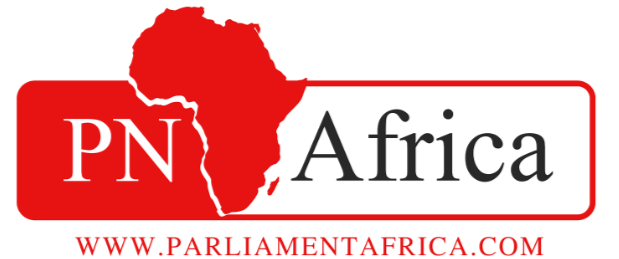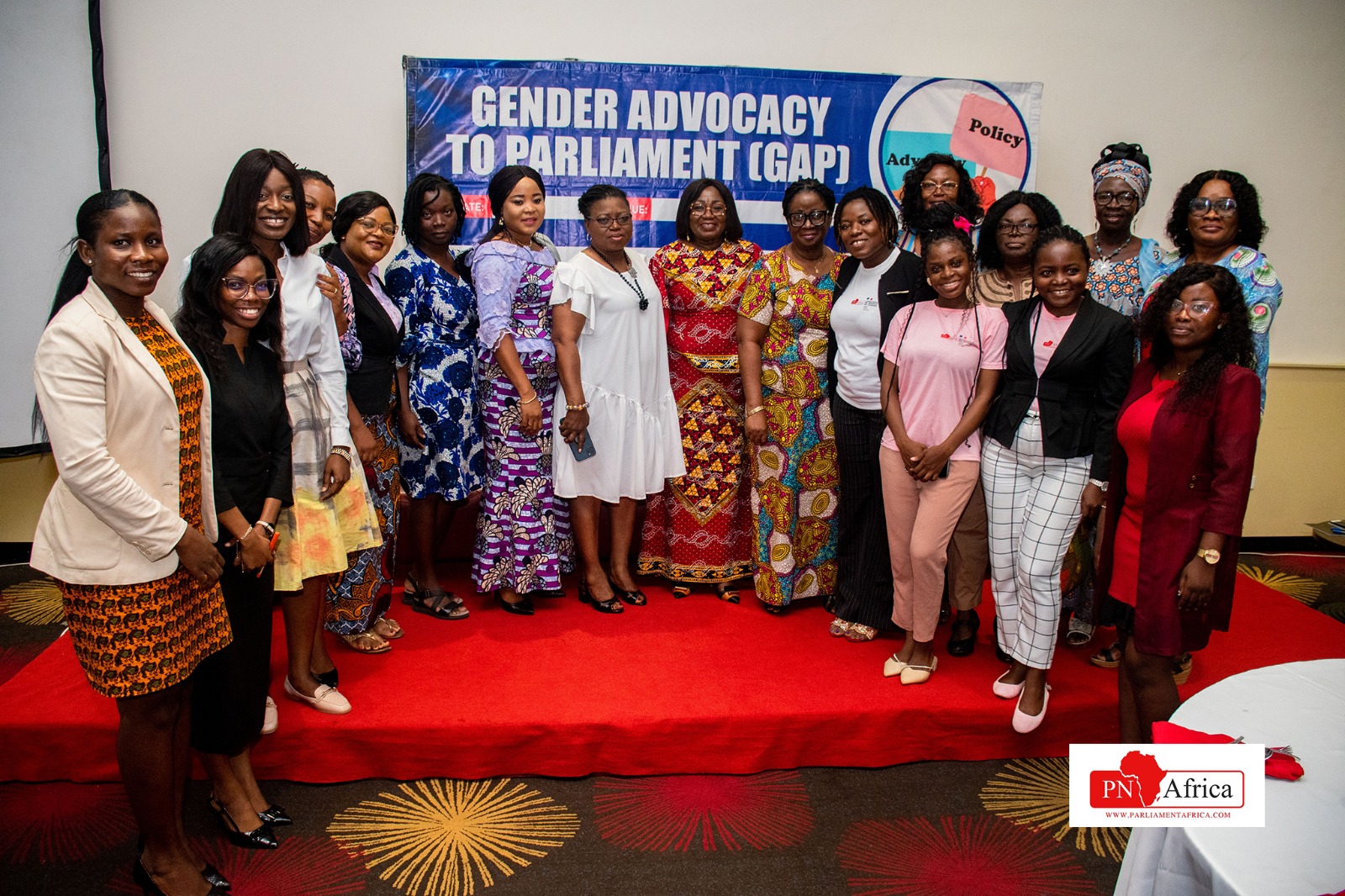By Joana Oppong Anani
In an attempt to fill the gender inequality gap in all spheres of national life including politics and governance, the Parliamentary Network Africa (PNAfrica) successfully saw through the implementation of the Gender Advocacy to Parliament (GAP) project with funding support from the French Embassy in Ghana.
Female MPs in Ghana face lots of challenges and therefore need support to deliver on their mandate.
Women make up the majority of the Ghanaian population, yet their voices are underrepresented. Parliament, as the House of Representation of the People, epitomizes this unfortunate situation with less than 15% of MPs being women (40 out of a 275 Member Parliament), and fewer issues around women and girls coming up for discussion there.
Although gender-based CSOs have a recognized role in social change and political dialogue, there is no sustained platform to get them closer to Parliament so they can play active roles in the laws and policy-making processes in this area.
The objective of the Gender Advocacy to Parliament Project is to strengthen gender-based CSOs for sustained engagements with women Members of Parliament (MPs) and for better parliamentary advocacy towards the adoption of laws and policies that guarantee equality, non-discrimination, gender equity, and the promotion of economic, social, political, reproductive and sexual rights of women and girls.
To achieve the above objective, the project implemented some activities such as regular town hall engagements between gender-based CSOs and women MPs in the six regions of Ghana where women have been elected as MPs, to ensure that the parliamentary agenda is considered through gender lenses.

Another activity was capacity building for CSOs on happenings in Parliament to ensure that they undertake evidence-based advocacy. Daily sittings of the Legislature were monitored to generate summary reports covering all issues that are of interest to women, children, and groups advocating for such courses and were published to keep parliamentary information readily available. A parliamentary advocacy handbook and other publications to serve as legacy knowledge products were also published as part of the Project.
On the 27th of July, 2022, a project inception meeting was held at the Parliamentary Training Institute (PTI) conference room at the Parliament of Ghana. The one-day hybrid meeting was held with 25 in-person participants and 15 virtual participants including some female Members of Parliament from among the Gender Committee, and some participants from gender-based CSOs. The meeting was also attended by a representative of the French Embassy in Ghana, Madam Alberta A. Ameziah.
The purpose of this meeting was to launch the project, get buy-in from parliamentary actors by aligning the project objectives with them, and ensure ground-softening for project implementation. To ensure greater buy-in to the project, the project team in another separate event, held a series of virtual and physical engagements with women Members of Parliament. These complimentary meetings were aimed at debriefing women MPs on the project and soliciting their cooperation for town hall meetings. All 40 women MPs were engaged through phone calls, emails and WhatsApp.
On the 7th of October, the Ketu South Constituency witnessed a significant town hall meeting that brought together women’s groups and associations. The gathering, held at the Verdi Pharmacy Conference room, aimed to address gender issues in the Parliamentary Agenda and empower women. Notable attendees included three Members of Parliament, Hon. Dzifa Abla Gomashie, Hon. Emmanuel Bedzrah, and Hon. Dzudzorli Gakpe, as well as traditional and divisional chiefs, along with approximately sixty participants.

The meeting commenced with Hon. Emmanuel Bedrah highlighting the crucial need for increased female representation in Parliament. He urged women to step into leadership positions as they are the best advocates for their own courses. Following this, the Programmes Manager of Parliamentary Network Africa (PNAfrica) delivered a presentation on ‘Gender Advocacy; Working Together With Your Female MP.’ He emphasized the importance of achieving gender equality and empowering women and girls, aligning with goal 5 of the SDGs.
The session moderated by Hon. Dzifa Gomashie allowed participants to interact with their Members of Parliament. Various challenges hindering women’s empowerment and equality were discussed, including the patriarchal system, teenage pregnancy, lack of spousal support, low education levels, and inadequate resources. In response, Hon. Gomashie shared her personal experiences and addressed these issues by advocating for education for both boys and girls, encouraging spousal support, and emphasizing the significance of proper upbringing.
The town hall meeting concluded with attendees stressing the importance of raising the discussed issues on the floor of Parliament. Additionally, they recommended the establishment of mentorship groups to guide teenage girls toward a brighter future. The event served as a pivotal platform for women to voice their concerns, advocate for gender equality, and empower each other in their pursuit of a more inclusive and equal society.
A second town hall meeting was held on Friday, May 5th, 2023, at the Ashanti Region Civil Servants Association Hall in Adum – Kumasi, the event saw the participation of approximately fifty individuals, including representatives from government institutions, media, women groups, and gender-based organizations. Notable attendees included Hon. Patricia Appiagyei, the MP for Asokwa Constituency.

Mr. Sammy Obeng, the Executive Director of PNAfrica and the meeting’s moderator, presented regional and gender-related discussions from the recent parliamentary meeting to guide the day’s discussions. Hon. Patricia Appiagyei emphasized the importance of women engaging with parliamentary proceedings to better understand policy-making and its impact on their lives. She highlighted the example of Argentina’s women’s mock parliament initiative, suggesting a similar approach in Ghana to boost women’s interest in legislative matters.
During the open-forum session, participants voiced their concerns, including the increasing rate of teenage pregnancy and HIV/AIDS cases, violence against women with ineffective legal repercussions, the need for support from men in empowering women, irresponsible fatherhood, lack of social and financial support for women and girls, high poverty rates, and the lack of financial literacy among market women. They also addressed issues related to the impact of illegal mining (galamsey) on cocoa farming and child labor in farming.
Representatives of gender-based CSOs raised broader concerns affecting Ghanaian women and suggested recommendations, such as promoting gender-sensitive decision-making at parliamentary and local government levels, providing financial literacy support for women at the local level, data-driven gender advocacy by CSOs, and advocating for gender-related policies like the Domestic Violence Act and sanitary pad tax.
The meeting’s key objective was to provide valuable feedback to female Members of Parliament, which will inform their work during gender-related deliberations in committee discussions and parliamentary proceedings. The insights gained from this feedback are expected to influence the formation and consideration of Bills/Acts and contribute to the passage of important bills like Affirmative Action, Intestate Succession, and Spousal Right Bills into law.
Overall, the town hall meeting served as an essential platform for dialogue and collaboration, fostering gender advocacy and addressing critical challenges faced by women and girls in the Ashanti Region and Ghana as a whole. Women’s engagement in the legislative process is seen as crucial for creating meaningful change and advancing gender equality in the country.






